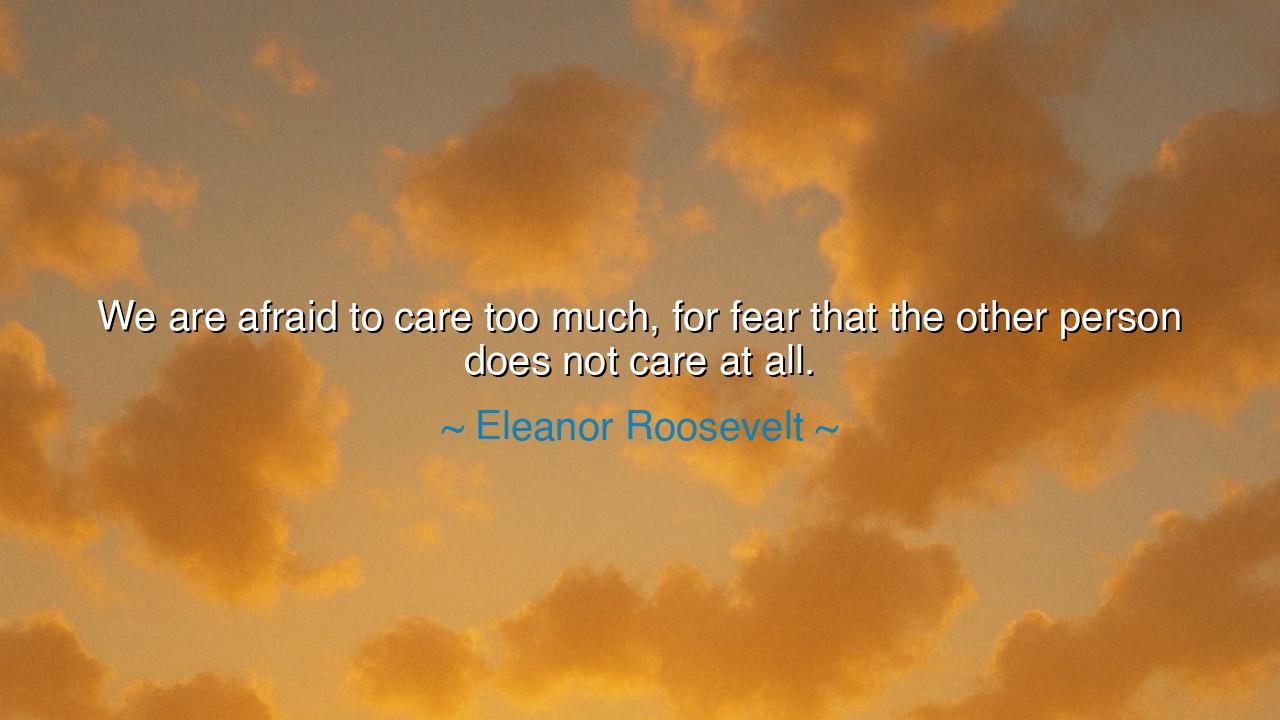
We are afraid to care too much, for fear that the other person






Eleanor Roosevelt, guardian of compassion and courage, once confessed the frailty of the human heart when she declared: “We are afraid to care too much, for fear that the other person does not care at all.” In these words lies the eternal struggle between vulnerability and love. To open the soul is to risk rejection; to care deeply is to stand unarmed before another, uncertain if their heart will answer in kind.
The ancients would have recognized this as the paradox of love and friendship. Warriors dared to face the sword, but often trembled before the silence of an unreturned affection. The fear of indifference is more cutting than steel, for it strikes not the body, but the spirit. Roosevelt gives voice to this universal truth: that the human soul longs to give freely, yet hesitates at the edge of rejection, where love may wither unreciprocated.
This teaching also reveals the hidden chains that bind us. We withhold our deepest care, not because our hearts are empty, but because our courage falters. In this way, love is lost before it is ever offered, and bonds are left unfashioned for want of boldness. Roosevelt’s wisdom calls us to see that fear of emptiness often robs us of fullness, and that the truest tragedy is not to be unloved, but never to have dared to love.
The origin of this thought springs from Roosevelt’s life of public service, where she witnessed the pain and isolation of countless souls. She knew that nations, like individuals, often withhold compassion out of fear — lest their mercy be unreturned, their generosity exploited. Her words remind us that the same hesitation that weakens hearts can also weaken societies, keeping humanity divided when it longs to unite.
Let the generations remember: to care is always a risk, but it is the only path to true connection. Cast aside the fear that silences affection, for even if it is not returned, the act of love itself strengthens the soul. Better to dare and be wounded than to withhold and be empty. Roosevelt’s wisdom, clothed in sorrow yet blazing with courage, calls us to live boldly in love — for in the end, it is not fear, but the absence of care, that leaves the heart desolate.






PSPham Suong
Roosevelt’s words remind me of how fragile relationships can feel when we care deeply but aren’t sure if the other person feels the same. It makes me wonder—are we more afraid of the vulnerability itself, or the potential hurt of realizing the other person doesn’t share our feelings? How can we learn to trust that caring for others, even when it feels risky, can bring us closer to the right connections?
NTNguyen Thom
I find Eleanor Roosevelt’s quote so relatable. It’s hard to let yourself care too much for someone, knowing that there’s a possibility they won’t return those feelings. But does holding back from caring out of fear really protect us in the long run? Or does it just prevent us from fully experiencing the richness of relationships? How do you push past this fear of rejection in relationships?
MPLe hoang Minh Phat
This quote speaks to the fear of emotional rejection. It's easier to guard our hearts than to risk the pain of caring deeply for someone who may not care back. But can we ever truly experience authentic connections if we don’t allow ourselves to care fully? Is it possible to find a balance between protecting ourselves and opening up to others?
DHPham duy hoang
Eleanor Roosevelt’s quote touches on the vulnerability we experience when we care deeply for someone, yet fear they might not feel the same way. It’s a painful truth that many of us can relate to—putting ourselves out there emotionally can be risky. How do you deal with this fear in relationships? Can you truly be open and vulnerable without the constant worry of unreciprocated feelings?